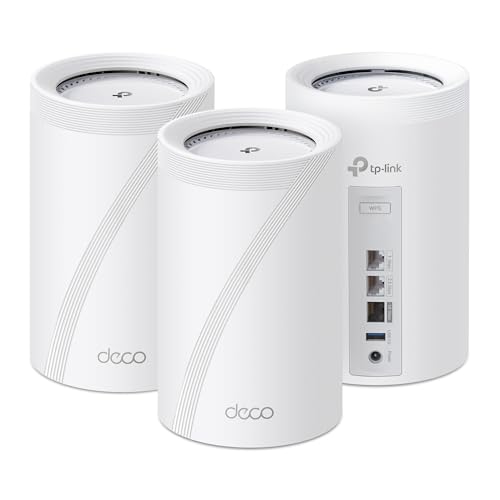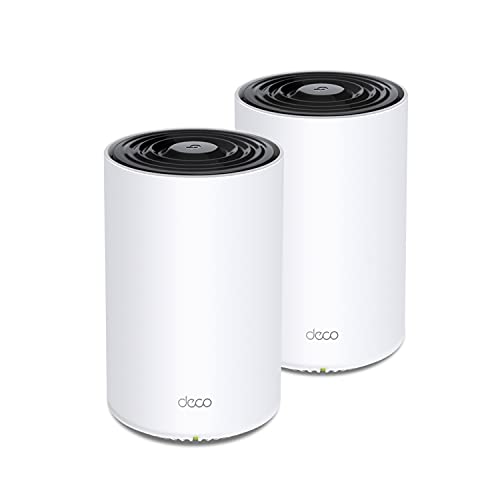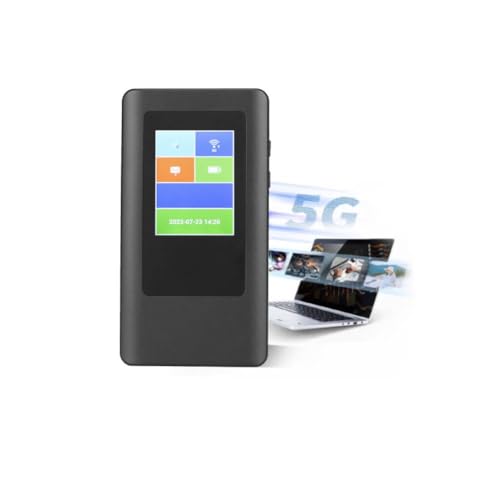10 Best Tp Link Deco Mesh We've Tested: Top Rate | SHR
Mike Kim Feb 22, 2026 12:38 AM
Experience the pinnacle of home networking with the best TP-Link Deco mesh systems. TP-Link has established itself as a leader in the field, offering state-of-the-art Deco mesh solutions designed to optimize your wireless network. In this guide, we explore the top TP-Link Deco mesh systems, showcasing their advanced features and unrivaled performance. Whether you're battling dead zones, seeking faster speeds, or aiming for seamless connectivity across your home or office, TP-Link Deco mesh has you covered. Join us as we unveil the top contenders in the TP-Link Deco lineup and discover how they can elevate your online experience to new heights.
Top Picks
Source: Amazon
Best Multi-Gig Wi-Fi 7 Mesh: TP-Link Deco BE95 BE33000 Quad-Band WiFi 7 Mesh System
Pros:
-
Quad-Band BE33000 Speed
-
10G Multi-Gig Ports
-
Expansive 7,800 Sq.Ft. Coverage
-
Strong Device Handling
Cons:
-
Premium Price
-
Bulky Units
The TP-Link Deco BE95 (2-pack) delivers a next-level Wi-Fi 7 experience designed for large homes and demanding users. With its BE33000 quad-band system, it offers a combined speed of over 33 Gbps across four frequency bands, ensuring seamless performance even for multi-device households. Coverage extends up to 7,800 square feet, eliminating dead zones and providing consistent connections across multiple floors.
Connectivity is another strong point. The Deco BE95 includes two 10G and two 2.5G Ethernet ports, ideal for gaming consoles, 8K streaming devices, or NAS systems. The system’s Multi-Link Operation and 320 MHz channels take full advantage of Wi-Fi 7, while TP-Link’s HomeShield adds an extra layer of security and parental control. Setup through the Deco App remains straightforward, even for non-technical users.
From a customer perspective, the Deco BE95 stands out for its future-proof speed and reliable coverage. Users praise its stability, device management, and ability to handle large smart home setups without performance drops. However, the high cost and large node design may deter casual users or those in smaller spaces. Overall, it’s a powerhouse mesh system built for serious connectivity needs.
Best Tri-Band Wi-Fi 7 System: TP-Link Deco BE67 Tri-Band WiFi 7 BE14000 Whole Home Mesh
Pros:
-
10 Gbps Multi-Gig Port
-
8,100 Sq.Ft. Coverage
-
Advanced Security Commitment
-
AI-Driven Roaming
Cons:
-
No 320 MHz Support
-
High Price Point
The TP-Link Deco 7 Pro BE14000 is built to deliver exceptional whole-home connectivity powered by Wi-Fi 7 technology. Its tri-band system with 8 streams pushes speeds up to 14 Gbps, ensuring smooth 8K streaming, responsive gaming, and fast downloads. Coverage extends up to 8,100 square feet, supporting over 200 connected devices without lag or signal drops. Each unit includes 10G, 2.5G, and 1G ports, giving users flexibility for wired connections to gaming consoles, smart TVs, or NAS systems.
TP-Link’s Secure-by-Design initiative under CISA enhances network protection, while built-in HomeShield tools further safeguard home devices. The 10G wired backhaul ensures stable communication between nodes, minimizing latency and maintaining consistent throughput. Setup through the Deco App is quick and intuitive, making it accessible for both advanced and casual users.
From a user standpoint, the Deco 7 Pro BE14000 impresses with its speed, reliability, and intelligent roaming capabilities. Many appreciate its ability to handle modern Wi-Fi 7 devices seamlessly and maintain stable connections across large homes. However, the premium cost and lack of ultra-wide 320 MHz channels may limit its appeal for those seeking full Wi-Fi 7 bandwidth potential. Still, it stands as a top-tier option for homes demanding both performance and security.
Best Tri-Band Stability: TP-Link Deco AXE5300 Wi-Fi 6E Tri-Band Whole-Home Mesh Wi-Fi System
Pros:
-
Strong Wi-Fi 6E performance
-
Seamless mesh coverage
-
Easy setup via Deco app
-
Elegant, compact design
Cons:
-
Limited advanced customization
-
Higher price point
The TP-Link Deco AXE5300 Wi-Fi 6E system delivers fast, reliable coverage across large homes using tri-band connectivity that efficiently balances traffic across 2.4 GHz, 5 GHz, and 6 GHz bands. With the Deco app, setup is quick and intuitive, making it ideal for users who value simplicity over complex configurations. Its compact, modern design blends easily into home décor while maintaining powerful throughput for multiple connected devices.
From a user’s perspective, the Deco AXE5300 stands out for its consistency and ease of use. Homeowners appreciate the stable network performance, especially in multi-story spaces or homes with thick walls. However, power users may find its limited control settings restrictive compared to more customizable routers in the same price range.
Best AI-Driven Mesh: TP-Link Deco XE75 AXE5400 Tri-Band WiFi 6E Mesh System
Pros:
-
Powerful Wi-Fi 6E tri-band speed
-
Wide 7,200 sq. ft. coverage
-
Smart AI-driven optimization
-
Simple app setup and Alexa support
Cons:
-
Few advanced customization options
-
Slightly bulky node design
The TP-Link Deco XE75 V2 delivers impressive tri-band Wi-Fi 6E performance designed to eliminate dead zones and lag in large homes. With support for up to 200 devices, it intelligently manages connections across the 2.4 GHz, 5 GHz, and new 6 GHz bands, offering total speeds up to 5,400 Mbps. The 6 GHz channel enhances stability and reduces interference, while the AI-driven mesh ensures seamless transitions as users move between rooms. Setup through the Deco app is straightforward, and integration with Alexa adds extra convenience for smart home users.
From a customer standpoint, the Deco XE75 V2 stands out for its consistent high-speed performance and ease of use. Gamers and heavy streamers appreciate its strong throughput and minimal latency. However, users seeking more granular control or advanced configuration tools may find its simplicity limiting compared to enthusiast-grade routers.
Best Dual-Band Coverage: TP-Link Deco AX5000 Mesh Wifi, 3-pack
Pros:
-
Wi-Fi 6 dual-band speed up to 5 Gbps
-
Coverage up to 7,100 sq. ft.
-
Supports up to 150 devices
-
Built-in TP-Link HomeShield security
Cons:
-
Limited advanced customization
-
Dual-band may be congested in busy networks
The TP-Link Wi-Fi 6 dual-band system delivers reliable high-speed connectivity for medium to large homes, combining two bands to support speeds up to 5 Gbps. Designed to handle up to 150 devices simultaneously, it is compatible with all Wi-Fi-enabled devices and major internet service providers. The system includes built-in HomeShield security, offering enhanced protection for connected devices and personal data.
From a user perspective, this system is valued for its strong coverage and ease of integration into existing home networks. Homeowners appreciate the simplicity of setup and the ability to maintain stable connections across multiple devices. However, in environments with heavy Wi-Fi traffic, dual-band networks may face more interference compared to tri-band alternatives, which some users might consider a limitation.
- 9.4
- BrandTP-Link
- 9.2
- BrandTP-Link
- 9.0
- BrandTP-Link
- 8.8
- BrandTP-Link
- 8.5
- BrandTP-Link
- 8.4
- BrandTP-Link
- 8.2
- BrandTP-Link
Last update on 2026-02-22 / Affiliate links / Images, Product Titles, and Product Highlights from Amazon Product Advertising API
Comparing the Deco X50 and X20 depends on your specific needs and preferences. Both models are part of TP-Link's Deco lineup of mesh Wi-Fi systems, but they have differences in terms of features, specifications, and performance. Here's a comparison to help you determine which one may be better suited for you:
Wi-Fi Standard: The Deco X50 supports the latest Wi-Fi 6 (802.11ax) standard, while the X20 supports the previous generation Wi-Fi 5 (802.11ac) standard. Wi-Fi 6 offers several improvements over Wi-Fi 5, including faster speeds, increased capacity, and better performance in crowded environments. If you have Wi-Fi 6-compatible devices and want to future-proof your network, the Deco X50 may be a better choice.
Speed and Performance: Due to the Wi-Fi 6 standard, the Deco X50 generally offers faster speeds and better performance compared to the X20, especially in environments with multiple connected devices. Wi-Fi 6 technology enables more efficient data transmission and better handling of simultaneous connections, resulting in smoother performance and reduced latency.
Coverage and Range: Both the Deco X50 and X20 are designed to provide excellent coverage and range throughout your home. However, the Deco X50 may offer slightly better coverage due to its improved Wi-Fi 6 technology, especially in larger homes or environments with challenging layouts.
Number of Bands: The Deco X50 operates on both 2.4 GHz and 5 GHz bands, while the X20 operates on the same bands as well. However, the X50's Wi-Fi 6 technology may offer better utilization of both bands, resulting in improved performance and reduced interference.
Price: The Deco X50 is likely to be more expensive than the X20 due to its Wi-Fi 6 capabilities. If budget is a consideration and you don't require the advanced features of Wi-Fi 6, the X20 may offer better value for your money.
In summary, if you prioritize faster speeds, better performance, and future-proofing your network, the Deco X50 with its Wi-Fi 6 support may be the better choice. However, if you have a smaller budget or don't require the advanced features of Wi-Fi 6, the Deco X20 still offers excellent coverage and performance for most home networking needs.
How do I choose the right Deco?
Choosing the right Deco mesh Wi-Fi system depends on your specific needs, preferences, and the characteristics of your home network. Here are some factors to consider when selecting the right Deco model:
Coverage Area: Determine the size and layout of your home or office to assess the coverage area needed for your Wi-Fi network. If you have a larger home or multiple floors, you may require a Deco system with more nodes to ensure comprehensive coverage throughout the entire space.
Number of Connected Devices: Consider the number of devices that will be connected to your Wi-Fi network. If you have many devices, such as smartphones, tablets, laptops, smart TVs, smart home devices, and gaming consoles, you may need a Deco system with higher capacity to accommodate the increased demand for bandwidth and connectivity.
Internet Speed: Assess your current internet speed and whether you plan to upgrade in the future. Choose a Deco model that supports speeds compatible with your internet plan and offers the performance you need for activities such as streaming, gaming, video conferencing, and browsing.
Wi-Fi Standard: Determine whether you require the latest Wi-Fi 6 (802.11ax) standard or if Wi-Fi 5 (802.11ac) is sufficient for your needs. Wi-Fi 6 offers several improvements over Wi-Fi 5, including faster speeds, increased capacity, and better performance in crowded environments.
Additional Features: Consider any additional features or capabilities you may need from your Deco system, such as parental controls, guest network support, Quality of Service (QoS) prioritization, and compatibility with smart home devices and virtual assistants.
Budget: Set a budget for your Deco mesh Wi-Fi system and compare the prices of different models within your budget range. Keep in mind that higher-priced models may offer more advanced features, better performance, and support for newer Wi-Fi standards.
Future-Proofing: If you want to future-proof your network and ensure compatibility with upcoming technologies and devices, consider investing in a Deco system with the latest Wi-Fi standard and advanced features that can adapt to changing networking requirements.
By considering these factors and evaluating your specific needs, you can choose the right Deco mesh Wi-Fi system that provides reliable coverage, high performance, and the features you require for your home or office network.
Is mesh better than extender?
Whether mesh Wi-Fi is better than an extender depends on your specific needs and the layout of your home or office. Here are some considerations to help you decide:
Coverage and Performance: Mesh Wi-Fi systems generally offer better coverage and performance compared to extenders. Mesh systems use multiple nodes placed strategically throughout your home to create a single, seamless network, while extenders simply repeat the existing Wi-Fi signal, which can lead to signal degradation and slower speeds.
Seamless Roaming: Mesh Wi-Fi systems offer seamless roaming, allowing devices to move between nodes without experiencing drops in connection. This is particularly beneficial for larger homes or spaces where you frequently move around while using Wi-Fi-connected devices. Extenders may require manual switching between networks as you move around.
Network Management: Mesh Wi-Fi systems often come with user-friendly mobile apps or web interfaces that allow for easy setup, monitoring, and management of your network. Extenders may offer limited configuration options and may require more manual setup.
Interference and Congestion: Mesh Wi-Fi systems typically use intelligent routing algorithms to optimize the network and reduce interference, resulting in better performance, especially in environments with many connected devices. Extenders may contribute to network congestion and interference, particularly if multiple extenders are used.
Cost: Mesh Wi-Fi systems tend to be more expensive upfront compared to extenders. However, they may offer better long-term value in terms of coverage, performance, and ease of use.
In summary, while extenders can be a cost-effective solution for extending Wi-Fi coverage in certain situations, mesh Wi-Fi systems generally offer better coverage, performance, and ease of use, making them a preferred option for many users looking to improve their home or office network.
Read More:
The Best Wireless Routers For Spectrum of 2026: Rankings
Best Gaming Router Reviews & Buyers Guide in 2026
After thoroughly evaluating the features, performance, and ease of setup, it’s clear that the best TP-Link Deco mesh systems deliver reliable, high-speed Wi-Fi coverage for homes of all sizes. Their combination of robust connectivity, user-friendly management, and strong security options makes them a top choice for anyone looking to upgrade their network. Whether you prioritize seamless streaming, stable gaming connections, or comprehensive home coverage, investing in a TP-Link Deco mesh ensures a consistently smooth and hassle-free wireless experience. For those seeking dependable performance without compromise, these systems stand out as a leading solution in the mesh Wi-Fi market.




























